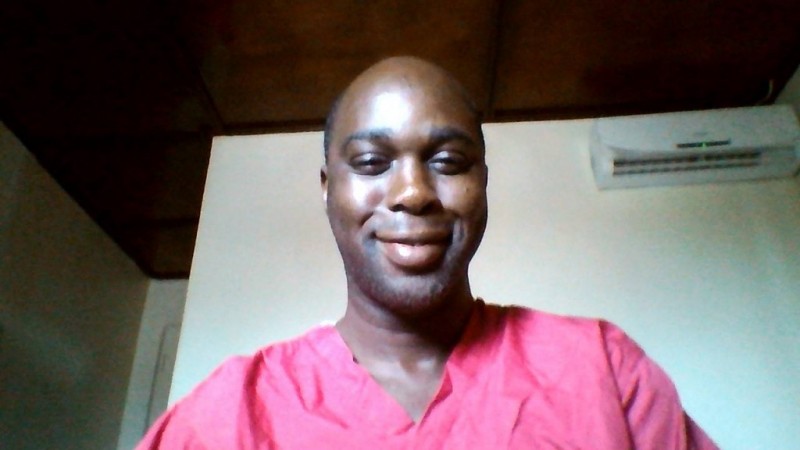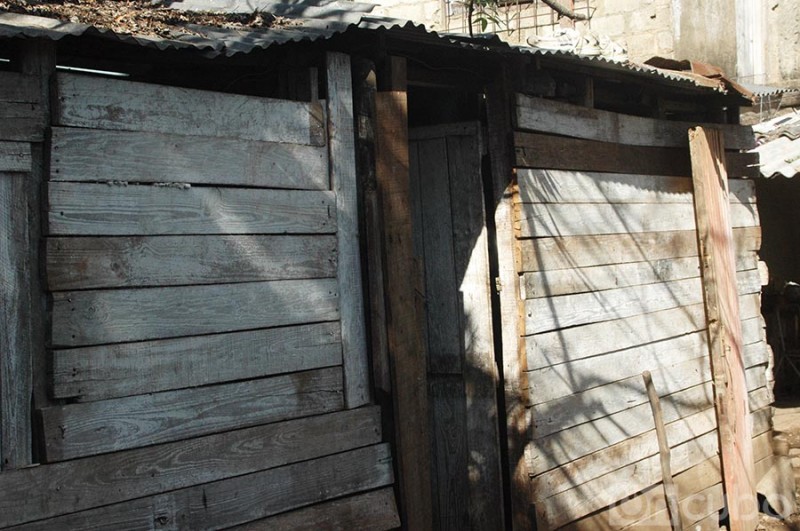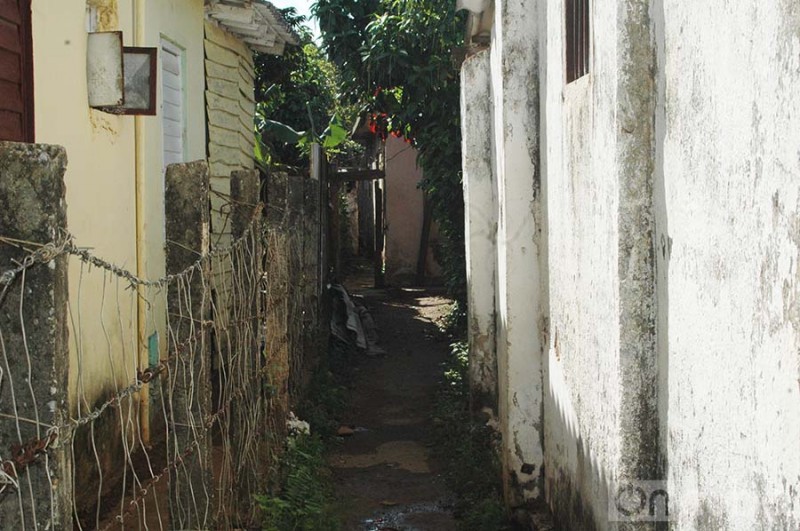
Reinaldo Villafranca. Photo from OnCuba and republished with permission.
Cuban nurse Reynaldo Villafranca died in Sierra Leone at the age of 43 on January 18, 2015, a victim of cerebral malaria. Villafranca had worked at the Ebola treatment center in Kerry Town since October 2014. The news was announced in a brief from the Cuban Ministry of Public Health, and broadcast by the media.
A recent article by young journalist and blogger Carlos Manuel Alvarez in OnCuba magazine highlights the difficult circumstances of Villafranca’s life and sexuality, relying on interviews with family and friends. It offers an intimate, human glimpse of Cuban medical international cooperation beyond the official (and simpler) narrative of heroism.
But the piece's honesty didn't sit well with everyone. Among the more than 70 comments posted on the OnCuba site, some attacked the author of the piece: “scribbler, pseudo-journalist, sarcastic, unjust, evil, vulture, degenerate.” This has fueled a debate on the limitations and shortcomings of journalism in Cuba today.
On his blog, journalist Rafael González wrote:
Al parecer, estamos ante un típico caso de respuesta del lector cosechado. La vergüenza de tener una audiencia aberrantemente deformada, incapaz de leer la belleza del elogio de Carlos Manuel Álvarez en su texto sobre Villafranca no es más que el triste resultado de la no existencia de medios de comunicación en Cuba capaces de hacer periodismo.
Apparently, this is a typical case of seasoned reader response. The shame of having an abhorrently deformed audience, unable to read the beauty of Carlos Manuel Alvarez’ praise for Villafranca in his text, is nothing more than the sad result of the absence of a Cuban media capable of doing journalism.
During his reporting, Alvarez paid a visit to Villafranca’s mother Justa Antigua, who “breaks down in tears without consolation, and requests to have her son returned to her,” and to her neighbor Alicia Cordero, where Villafranca used to go “to confess and to eat whatever Alicia has in her pots or in the refrigerator: a chicken, croquettes, a smoothie, a fruit juice.”
There, he discovered that Villafranca studied nursing in 1997 as part of some courses offered by the Cuban government and specialized in intensive care. He worked for a year in the local hospital's therapy room, and then was transferred to the San Diego polyclinic, about 20 kilometers from Los Palacios.

Casa de Villafranca. Photo from OnCuba and republished with permission.
Sigue pasando cursos de la salud y cursos de inglés [….] Atiende también a los vecinos de la cuadra (una práctica común entre los médicos y enfermeros cubanos, trabajar incluso fuera de horario). Siente predilección por los pacientes de la tercera edad. Colostomías, cánceres. Y siempre, según todos los que lo recuerdan, muy jaranero, muy divertido, repleto de facundia. No esconde su homosexualidad. Se mete con los vecinos y bromea. Es libre, quizás hasta demasiado libre para un pueblo tan pequeño.
He passes health and English courses [….] He also cares for the neighbors on the block (a common practice among Cuban doctors and nurses, even working after hours). He prefers to care for elderly patients. Colostomies, cancers. And always, according to all those who remember him, he was very boisterous, very fun, full of eloquence. He does not hide his homosexuality. He teases and jokes with the neighbors. He is free, maybe even too free for such a small town.
The last time Alicia Cordero managed to talk to Villafranca was on December 30. “Alicia says he was happy,” explains the journalist, “because they had saved three children”.
En la mañana del 17 de enero, presenta los primeros síntomas diarreicos, y en la tarde lo asalta una fiebre de 38ºC. Le hacen la prueba de Malaria. La prueba da positivo. Le inician tratamiento antipalúdico por vía oral. La fiebre sube. Pierde el sentido del tiempo y el espacio. Lo trasladan al hospital de la Armada Británica. Allí lo ingresan. La prueba de Malaria vuelve a dar positivo, y la prueba de Ébola, negativo. Le aplican la última generación del tratamiento antipalúdico por vía endovenosa.
Durante la noche y la madrugada, el cuadro clínico se agrava. Presenta dificultades respiratorias, toma neurológica. Lo acoplan a un equipo de ventilación pulmonar. Pero no responde al tratamiento, y horas después fallece.
On the morning of January 17, he presents the first diarrhea symptoms, and in the afternoon he has a fever of 100.4°F. He is tested for Malaria. The test is positive. They start oral antimalarial treatment. The fever rises. He loses his sense of time and space. They move him to the British Navy Hospital. He is admitted there. Once again the Malaria test is positive, and the Ebola test negative. They apply the latest generation of intravenous antimalarial treatment.
During the night and early morning, his condition worsens. He has breathing difficulties, neurological problems. He is put on pulmonary ventilation equipment. But he does not respond to treatment and dies hours later.

Casa de Villafranca. Photo from OnCuba and reproduced with permission.
According to journalist and blogger Disamis Arcia, one of the main achievements of Alvarez's article “is that, while I was reading this piece, I felt that I could touch Villafranca with my hands, and understand him, his motivations and frustrations, his dreams, and especially the quiet heroism of his tremendous love of neighbors.” For photojournalist Kaloian Santos, “until now, before reading this post, based on the impression that I had when I learned of his death in the news given sparingly by our media, the Cuban health collaborator was just a man who had the grim reaper knock on his door.”
Manuel David Orrio, a former agent for the Cuban State Security agency, was critical. He believed that the piece “contravenes all codes of journalistic ethics in force in many countries worldwide, and contains elements, judgments, assessments, which would not only be judged as ethical violations, but that would be of interest for the courts,” although he does not specify the alleged charges under which the journalist would be accused.
The journalist González concluded that:
El texto de Carlos, sin los afeites típicos de las loas con las cuales se suele abordar el tema del internacionalismo en Cuba, logró conectarnos a muchos con la tremendísima condición humana de ese enfermero, que pudiera ser cualquier otro brigadista, pero era este. Un maricón. El menor de un montón de hermanos delincuentes. Un tipo que a pesar de los tantísimos pesares quiso estudiar y ser enfermero para ponerse al servicio de otros. Porque los contextos importan. Los contextos, que, entre otras cosas, formaron a Villafranca y nos dicen a nosotros lectores -crónica de Carlos mediante- que estamos ante un ser de carne y hueso que lucha y sangra, y no ante otra postal de la Revolución.
Carlos’ text, without the compliments of the praises normally used to address the topic of internationalism in Cuba, managed to connect many people with the human condition of this nurse, who could be any other brigade member, but was this man. A “faggot”. The younger brother of many criminal siblings. A guy who despite so many sorrows wanted to study and be a nurse to be at the service to others. Because context matter. A context that, among other things, formed Villafranca and that tells us readers -through Carlos’ piece- that we are in the presence of a man that is made of flesh and blood, who fights and bleeds, and not just another postcard of the Revolution.
Villafranca is the second Cuban collaborator who dies in Sierra Leone.






